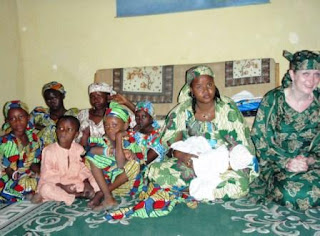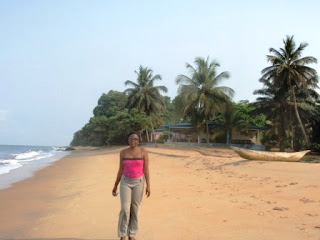







In the Far North of Cameroon there is an exceptionally high incidence of VSO volunteers marrying Cameroonians (I won't try to explain this phenomenon!). Many couples settle in the home country of the volunteer after going through the usual visa saga but some prefer to stay in Cameroon. Recently we went to the christening of a baby of an English volounteer who converted to Islam and married a muslim. She is clearly very happy.
When a girl gets married she is expected to have a baby immediately and to continue to have babies in quick succession. Fifteen and sixteen year old girls carrying babies are a common sight (if not fully veiled or confined to their compound) and usually their education has been terminated. This poses a significant problem for them if subsequently they are divorced or abandoned. Some live a life of almost total seclusion, their husbands refusing to let them leave their compound. One of the volunteers working in education organised a committee of mothers of school children. She asked the local chief to encourage the husbands to give them permission to attend meetings. His response was that women should leave their house twice in their lives, once to get married and once to be buried. In less extreme cases, I have frequently found that women invited to social events where alcohol will be available have been denied permission to attend by their husbands. It is not unusual for such husbands to drink alcohol and to turn up with a male drinking companion.
People rationalise their large family sizes on the grounds that many children will die and they will need survivors to look after them in their old age. Recently I went to a funeral of a one year old child of a council colleague. He told me that this was the fifth of his twelve children to die. Having daughters is rewarding because they do a lot of work in the household and they are then married off in return for a dowry, rather like livestock.
Funerals are frequent occurrences here. Some deaths are quite needless. For example, a twenty five year old girl who lived with her uncle while attending university in Maroua died of malaria: the uncle, who is relatively well off, had refused to pay for medicines. Recently a council colleague died, the third among 30 employees in my two years with the council. Usually the burial takes place immediately (because of the heat) and there is a "deuil", or sort of wake, which lasts for at least a week. If it is a Muslim who has died, I can sympathise only with the men, who are usually seated outside the house under a tree or hangar. A recent Christian deuil took that form also but the father brought me into the house to sympathise with his wife. I went to an animist deuil and found that the men and women mixed freely (drinking bilbil, a local brew). The husband had lost one of his six wives and he claimed to have 67 children. One of his wives was again pregnant. He asked me to get my camera and when I brought it he led me outside his compound to show me his wife's grave and then asked me to photograph him on the grave with some of his children.














